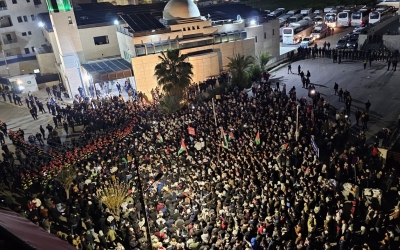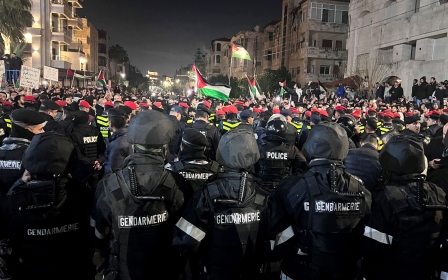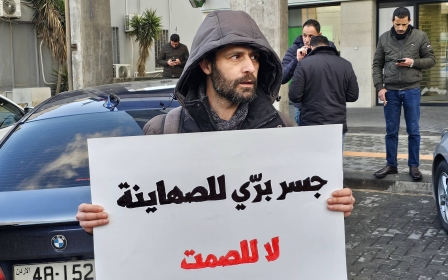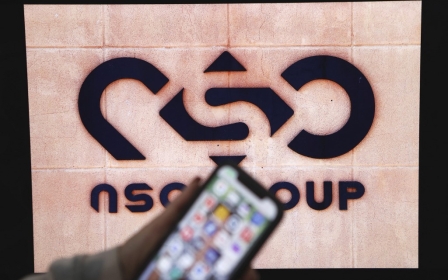Jordan failed to stop pro-Palestine protests. Now it's accusing Hamas of leading them
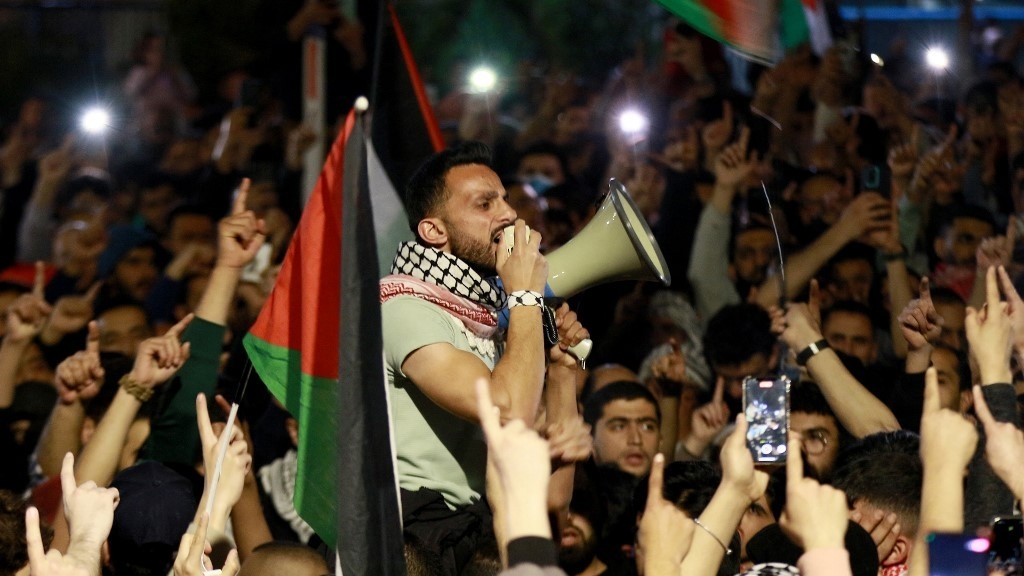
Jordanian authorities have clamped down on participants in the daily protests against the Israeli war on Gaza, amid accusations that Hamas has a role in igniting them.
Thousands have been protesting daily in Ramadan in front of the Israeli embassy in the capital, Amman, demanding its closure and an end to normalisation with Israel in response to its atrocities in Gaza.
The protests continued even though the embassy has no diplomatic mission, following the departure of Israel's ambassador in October and Jordan's recalling of its ambassador in protest of the Israeli war on Gaza.
Jordanian authorities have been caught off guard by the size of the Ramadan protests, which average between 6,000 to 10,000 participants.
Columnists and former officials have attacked Hamas leaders, especially Khaled Meshaal, accusing the movement and the Muslim Brotherhood of trying to create chaos in Jordan.
New MEE newsletter: Jerusalem Dispatch
Sign up to get the latest insights and analysis on Israel-Palestine, alongside Turkey Unpacked and other MEE newsletters
Former information minister Samih al-Maaytah accused the Hamas movement abroad of collaborating with the Muslim Brotherhood in Jordan to advance Hamas's political agendas.
"Hamas abroad is trying to pressure Jordan to restore relations with the movement," he said, citing a speech on 26 March in Amman by Meshaal, the head of Hamas abroad, calling on millions to take to the streets.
'Hamas wants to send a message that it can influence and lead the Jordanian street'
- Samih al-Maaytah, former Jordanian minister
"Hamas wants to send a message that it can influence and lead the Jordanian street, which is also convenient for the Iranians who have not been able to exercise any political influence in Jordan," Maaytah told MEE.
Jordanian government spokesperson Muhannad Moubaydeen said on Tuesday that the government did not mind the demonstrations, but was concerned about the chants, which it views as pro-Hamas.
"Jordanian security is charged with protecting the demonstrators and ensuring their safety, but the problem is those who harm national security and come out with unacceptable chants," he said in a press conference.
The Muslim Brotherhood in Jordan has rejected these accusations.
According to Murad al-Adayleh, the Secretary-General of the Islamic Action Front, a party affiliated with the Muslim Brotherhood, "there are no special party interests in these protests, which represent all sectors of Jordanian society that support the Palestinian resistance".
"The Jordanian people's relationship with the Palestinian issue is different from any Arab people because it is geographically and demographically related to Palestine," Adayleh told MEE.
"We paid sacrifices and sacrifices from our children for the sake of Palestine, so it is natural for us to see these sit-ins in all cities."
Adayleh said the accusations of Hamas's role in the protests seek to discredit the protest movement, which has so far been the largest in the Arab world.
"There are attempts to demonise the Jordanian movement because it has begun to influence the Arab street and has galvanised protests in other Arab countries," he said.
Jordan was the second Arab country after Egypt to normalise relations with Israel in 1994, in a peace treaty that remains deeply unpopular in the country. Jordanians have also denounced the kingdom's import of Israeli gas as "treasonous".
Hundreds detained
Jordanian security services have detained hundreds of political activists from different parties since the beginning of the 7 October war.
Lawyer and former judge Louay Obeidat said that more than 1,500 activists have been prosecuted for their protest activities.
Many of them have been released, but dozens remain in administrative detention, while seven are considered to have been forcibly disappeared.
Among the detainees was trade union activist Maysara Malas, who has been in administrative detention, held without charge for the past four months in connection with the protests.
Malas's family said that 20 members of the General Intelligence raided his house in al-Rashid suburb at dawn on 4 January to arrest him.
During the raid, the officers asked all family members to turn off their phones, searched the house and Malas's car, and confiscated documents, electronic devices and surveillance camera tapes, the family said in a statement.
After an hour-and-a-half-long search of their house, Malas was handcuffed and detained without any charge.
He remains in detention at the General Intelligence Department, and his lawyer has been prevented from visiting him, according to the family.
The National Alliance for Rights and Freedoms, a group of human rights activists, said that the Jordanian authorities pursued a huge number of activists in connection with the sit-in near the Israeli embassy.
Middle East Eye delivers independent and unrivalled coverage and analysis of the Middle East, North Africa and beyond. To learn more about republishing this content and the associated fees, please fill out this form. More about MEE can be found here.


